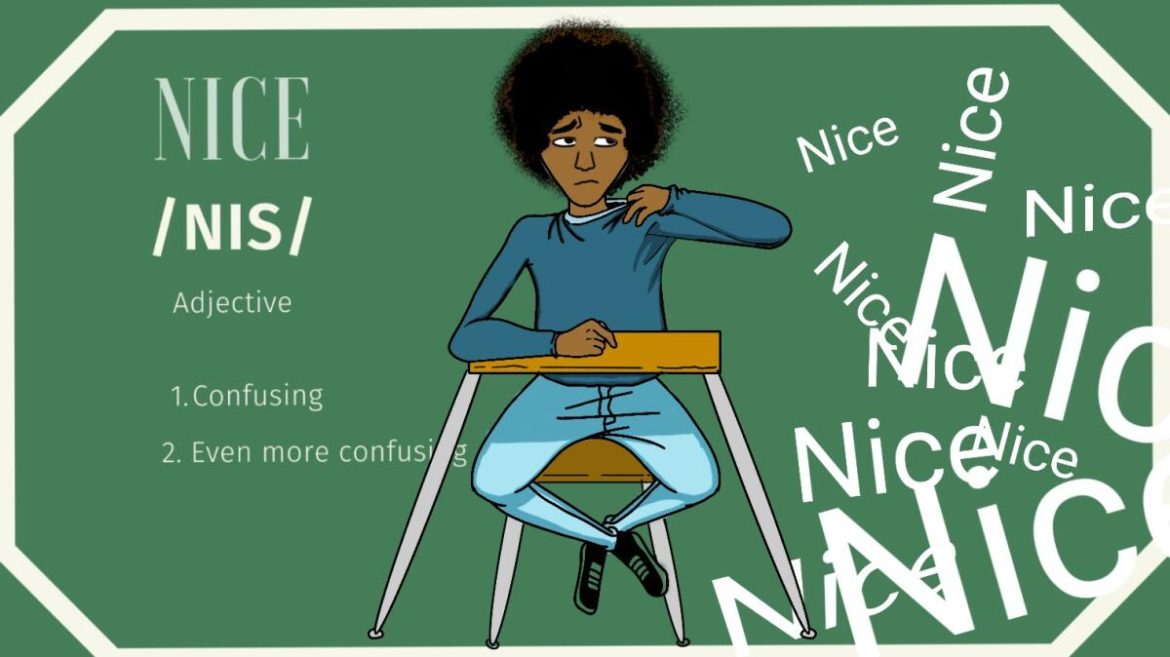A student struggles with understanding which definition of “nice” is most accurate, clearly showing the several defining characteristics the word can have. News staffer Emily Couch writes a social commentary about the contradictory definitions that the word “nice” has accumulated within teenagers’ conversations. Illustration by Antonio Starks
News staffer Emily Couch describes the three common and contradictory definitions of the word “nice,” explaining how each one differs from one another.
Nice.
A four-letter word that can be misinterpreted or taken out of context very easily. Among its many uses, one can utilize it as a compliment or as a quick escape when one doesn’t know what to say or how to say it.
This short, one-syllable word has enough power in conversations to have three entirely different definitions, each one with its own purpose.
Let’s start with the basics: the substitution. When used with this definition, “nice” substitutes itself in various sentences, described as both pleasant or good, or ‘I don’t care enough to give you a real answer’. This definition is often used as a descriptive adjective.
When one asks someone how their day went, a common response is “It was nice.”
It doesn’t matter if you’ve had a terrible, horrible, no good, very bad, day. “Nice” will always be the easiest, most non-energy-inducing response you could possibly reply with.
It doesn’t matter if you’ve had a terrible, horrible, no good, very bad, day. “Nice” will always be the easiest, most non-energy-inducing response you could possibly reply with.
It’s almost ironic for such a bland, saltine cracker-type word to have the often-used power to encapsulate someone’s emotions. That’s the kicker – it doesn’t, not really. This definition equates itself with the “I’m fine” response, one that is commonly used when either someone doesn’t want to talk about it, or, rarely, genuinely feels fine.
Then there’s option two: the filler of silence.
When two people are having a conversation and the awkwardness starts to become unbearable, the word “nice” can become a saving grace for everyone involved.
Let’s face it, rather than having to actually listen to someone who sees participating in drama as a recreational sport, using the word “nice” as a reply can effortlessly show that you are “paying attention,” or genuinely care.
What one could say is “how am I supposed to respond to another one of your narcissistic comments that has nothing to do with me?” But of course, that much honesty requires too much energy.
That much honesty requires too much energy.
Finally, there’s the so-called character trait.
The average human thrives on compliments, especially because it opens a door for them to talk about themselves. However, when someone is trying to think of a descriptive word or “compliment” for someone when they can’t say idiotic or rude, the common response is “Uh, they’re nice.”
But in all seriousness, being called “nice” can sometimes be worse than any of the other options above. Not only is it a full-on backhanded compliment, but the way it reeks of insincerity is borderline damaging to someone’s self-esteem and overall confidence levels.
Unfortunately, this four-letter word will continue to accumulate different definitions, some being a rock to rely on while others bruise an ego or two. But I guess it’s nice to have options.
